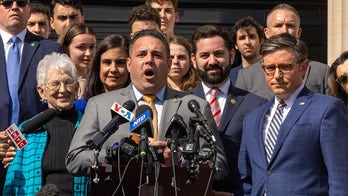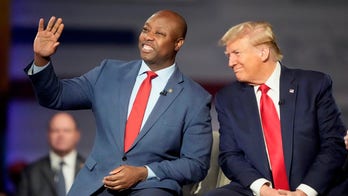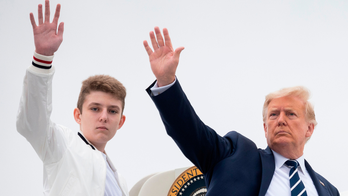The strained relationship between the White House and congressional Democrats is headed for another bad turn as President Obama tries to win an increase to the government’s $14.3 trillion borrowing limit.
Obama’s 2012 campaign strategy of distancing himself from Washington, including the members of his own political party, was on ostentatious display during last week’s fight over a spending plan for the remainder of this fiscal year.
As Harry Reid worked to hold his fractious Democratic Senate caucus together behind a deal with the hard-line Republican House, the president was out on the road blowing great hot gusts about wind energy and lamenting the ways of the federal city.
“Washington gets all worked up, just like clockwork. Republicans and Democrats both start making a lot of speeches,” the president told workers at a Spanish-owned wind-turbine plant. “Usually the Democrats blame the Republicans; the Republicans blame the Democrats…”
Er, but aren’t you the captain of one of those teams, Mr. President?
Two of the softest spots for Obama in public opinion polls are on his handling of the deficit and for failing in his promise to change the way Washington works. For a president who ran as a change agent and with an electorate increasingly concerned about a debt that grows at a pace of $3.5 billion a day, these are not good weaknesses to have.
Liberals should remember the aforementioned chinks in his armor before they accuse Obama of caving in too quickly to Speaker John Boehner.
Obama no doubt believes that the government must spend more to prop up the puny economy, but the realities of his re-election campaign explain Obama’s quick transition from calling for more spending this year, to seeking negligible cuts to heralding the “the largest annual spending cut in our history,” which he called “painful, but necessary.”
Obama has been rather wobbly on the matter of debt and deficits. There had been some excitement over the debt commission Obama impaneled last year. But hopes that there was budget hawk rustling behind the big-spending stimulator of 2009 and 2010 were dashed when Obama released his budget for next year without a whisper of a remedy for overspending. He would instead wait and see.
That opened a lane for House Budget Committee Chairman Paul Ryan to make his own proposal. And that is where the interests of Obama and his former congressional colleagues began to diverge.
In order to get re-elected, Obama needs to look credible on debt and deficits. In order to reverse their losses in Congress, Democrats need to demonize Republican efforts on debt and deficits. Now that’s a tight squeeze, right there.
The clearest path to victory for Obama is to embrace austerity in the form his debt commission’s plan and join hands with fiscally moderate Republicans. Picture him standing with Tom Coburn and Mark Warner calling for a new era of fiscal responsibility. David Gergen might just faint from the pure Clintonian genius of it all.
But if Obama were to take the easy way on debt fixing, the fight he’s been having with his base would turn into an all out war.
The Democratic family feud has mostly been kept indoors so far. While liberals resent Obama’s apostasies or failures on the Afghan war, Guantanamo Bay, Bush tax rates, spending cuts etc., a stark political reality hangs overhead: he is the personification of their party.
The only hope Democrats have for a good year in 2012 is for Obama to have a good year. While he won’t have coattails if he wins, the president will have a serious blast radius if he implodes.
Democrats grouse about Obama and his efforts to position himself for 2012, but they know they need a winner at the top of the ticket. But this debt and deficit business complicates all that.
The killing fields for Democrats in 2010 were in Florida, the Rust Belt and Appalachia. One of the most effective tools Republicans had in these regions was pointing to the votes of incumbent Democrats for Obama’s health care law that cut $500 billion from Medicare.
With high concentrations of older voters and lots of economic uncertainty, these regions are always ripe for entitlement scaremongering. And here is Obama threatening to take the issue away, right when Democrats are trying to win back 25 of the 63 House seats they lost and hold on to a narrowly divided Senate.
Obama’s Wednesday speech on the debt is but a slim counteroffer to Ryan’s plan, but it is the start of a negotiation that may end with Democrats out of a major talking point.
Members of the president’s party will excuse the speech not just because it will be centered on tax increases, ahem, “revenue enhancements,” but also because Obama must engage on the subject if he expects to win approval for his debt-ceiling request. They believe the White House descriptions that an impasse on debt would result in “Armageddon-like” scenario in financial markets.
Having seen how Republicans fought like a pack of angry ferrets for cuts in a 25-week federal spending plan, Democrats know Obama will have to come up with some pretty strong stuff to get permission from the House to add a couple of trillion dollars to the national debt.
This is bad ground for Obama since the public recoils from the idea of adding more debt. Other than seeking a tax hike, it is likely the least popular fiscal request a president can make. Obama knew it when he poured venom out on President George W. Bush’s 2006 request before voting against it, and he knows it now that he’s the one doing the asking.
Ryan’s budget is the price Republicans are seeking for a debt-limit increase. Wednesday’s speech will be Obama’s counteroffer. And while the president may be hoping that the bipartisan Gang of Six in the Senate bails him out with a compromise proposal, the fight over the debt ceiling and the 2012 budget will be fought dollar by dollar between Boehner and Obama.
Democrats will be watching with increasing anxiety for signs that Obama is treating entitlement reform as a subject for polite company. How can you accuse Republicans of locking seniors in a “death trap,” if your own president is on board with the deal?
Chris Stirewalt is FOX News’ digital politics editor. His political note, Power Play, is available every weekday morning at FOXNEWS.COM.




